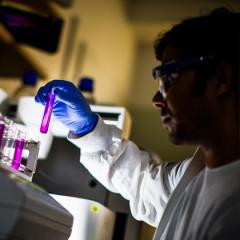Researchers at the University of Queensland’s Australian Institute for Bioengineering and Nanotechnology are working to develop a vaccine in just 100 days to support future pandemic preparedness.
The ‘100 Days Mission’ challenge – set by the Coalition for Epidemic Preparedness Innovations (CEPI) – is a real-time test to see how fast science can respond to emerging viral threats.
Led by vaccine development expert Professor Keith Chappell, UQ’s Vaccine Rapid Response team is now 65 days into the challenge of producing the first-ever vaccine for the deadly Bolivian Chapare virus, which causes severe haemorrhagic fever.
“Our goal is to get as close as possible to achieving CEPI’s aspirational ‘100 Days Mission’ to create a vaccine from scratch in just over three months when faced with a new pandemic threat,” Professor Chappell said. 
“It took a little less than a year for the first safe and effective COVID-19 vaccines to be developed and approved for use.
“That’s an astonishing timeframe to develop a medical defence system, but it still wasn’t quick enough to prevent COVID-19 from surging across the world.
“While we might not know when or where the next viral threat will emerge, this challenge can improve how quickly we respond and hopefully save more lives.”
To mimic the environment of a sudden emergent viral threat, the team was given the Chapare virus as their target in March. Since it was first identified in 2003, there have been five known outbreaks of the virus, exclusive to Bolivia, with a laboratory-confirmed case reported in January this year.
Join The Network
Stay on top of our industry news and developments, events and opportunities, by joining The Network
“This pressure test is ultimately designed to show us where the pain points are in moving so quickly, to show us what works, and what doesn’t work when making a new vaccine.
“We want to prove that the combination of our Clamp2 technology and the people we have in the team are able to generate a safe and effective vaccine within a highly accelerated timeline.”
The 20-person team’s goal is to create 26 different vaccine candidates for the virus, using their re-engineered Clamp2 molecular clamp technology, which successfully completed an early-stage clinical trial last year.
The most promising candidate will be used to create a clinical grade batch at AIBN’s National Biologics Facility, with the process fully documented, reviewed and supplied to CEPI for potential use in future Chapare virus outbreaks.
CEPI project leader Dr Nicole Bézay said the team’s work could make it much quicker to produce a vaccine should there be a significant outbreak of the Chapare virus, but the main focus is on testing and improving the vaccine development process for the re-engineered clamp technology.
“Our partnership with the UQ team is about safeguarding the world from the threat of unknown viruses with pandemic potential,” Dr Bézay said.
The work highlights AIBN’s critical role in advancing vaccine technology and strengthening global pandemic preparedness.
Want to learn more about this story or how you can partner with AIBN on ground-breaking research?
Contact us via email: communications@aibn.uq.edu.au
or phone: +61 414 984 324


